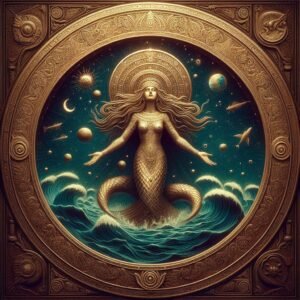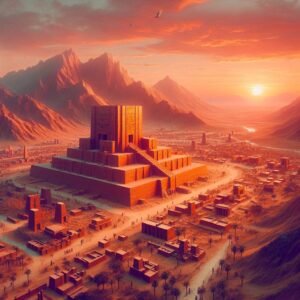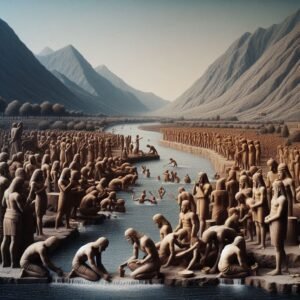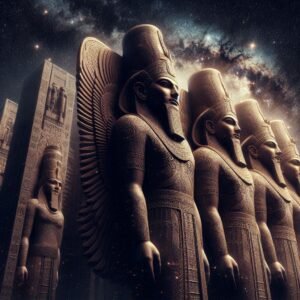Category: Mesopotamian mythology

Nammu is a primordial goddess in Sumerian mythology, often associated with the creation of the universe and humanity. She embodies the primeval waters, an elemental force from which life and the pantheon of gods emerged. As a creator deity, Nammu’s role is pivotal in the cosmogony of Mesopotamian belief systems, where she is revered as the mother who gave birth to the major deities, including Enki, the god of wisdom, water, and creation.
Permanent link to this article: https://truthofself.com/the-goddess-nammu/

Enki, known as the Sumerian god of water, wisdom, and creation, holds a pivotal place in Mesopotamian mythology for his role in the creation of humanity.
Permanent link to this article: https://truthofself.com/the-god-enki/

Anu, the supreme deity of the ancient Mesopotamian pantheon, was revered as the god of the sky and the embodiment of heavenly power. His dominion was the highest celestial realm, a symbol of overarching authority and order in the cosmos.
Permanent link to this article: https://truthofself.com/the-god-anu/

The Citadel of Erbil, a fortified settlement atop an ovoid-shaped tell in the heart of the Kurdistan region of Iraq, is a testament to the longevity of urban human settlements. Its history of continuous habitation stretches back over 7,000 years
Permanent link to this article: https://truthofself.com/the-citadel-of-erbil/

The Sumerians, deeply connected to the Tigris and Euphrates rivers that cradled their civilization, had a profound reverence for these waterways, which was reflected in their religious rituals. One such ritual was the ‘mîs-pî’, an intricate ceremony that involved the ‘washing of the mouth’ of divine statues, symbolizing purification and the induction of life into the idols.
Permanent link to this article: https://truthofself.com/the-sumerian-reverence-for-rivers/

The cradle of civilization, Sumer, was home to the world’s first urban centres, where the wheel of history began to turn. Among the most prominent cities that rose from the fertile Mesopotamian plains were Uruk, Ur, Eridu, Nippur, Lagash, and Kish.
Permanent link to this article: https://truthofself.com/the-sumerian-cities/

Uruk, known today as Warka, was one of the most significant early cities in ancient Mesopotamia, located in the southern region of Sumer. Founded around 4500 BCE, Uruk is often credited as the birthplace of writing, around 3200 BCE, marking a pivotal moment in human history.
Permanent link to this article: https://truthofself.com/the-sumerian-city-of-uruk/

Ancient Mesopotamia, often referred to as the cradle of civilization, was home to a rich tapestry of religions and mythologies that evolved over millennia. This page serves as a starting point for our journey into Sumerian, Akkadian, Babylonian and Assyrian beliefs.
Permanent link to this article: https://truthofself.com/the-beliefs-of-ancient-mesopotamia/
-
By Barra in Akkadian Mythology, All, Anunnaki, Archetypes, Christianity, Greek Mythology, Judaism, Mesopotamian mythology, Norse Mythology, Paganism, Religion, Sumerian mythology
-
July 12, 2024

The Anunnaki, a term that echoes of ancient Sumer, refers to a pantheon of deities revered by the Sumerians, Akkadians, Assyrians, and Babylonians. Were these also the Watchers and Nephilim of the Book of Enoch, are these what some today call the cabal?
Permanent link to this article: https://truthofself.com/the-anunnaki-and-the-birth-of-the-cabal/

Many of the world mythologies include the concept that the world was created for some form of primordial goo, or water. For example, the “goo” in the Shinto creation myth refers to the primordial chaos from which the world was created.
Permanent link to this article: https://truthofself.com/primordial-goo-and-the-mother-of-creation/










